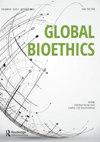Towards a new ethics for bioculture
Q1 Arts and Humanities
引用次数: 0
Abstract
The ethics of bioculture deals with moral questions raised by the cultivation and farming of living things. P. W. Taylor believes that they have an inherent worth just like animals and wild plants. Therefore, judgment about how they should be treated cannot be limited to the principle of greater efficiency for the benefit of humans. Taylor developed a comprehensive theory that is founded on the symmetry between human and environmental ethics. He believes that every living thing is teleologically oriented and a member of the earth's biotic community. A systemic and hologrammatic approach is the alternative to Taylor's ethics of bioculture. Each component of an ecosystem characterised by contingency, plays a role in co-evolution. Therefore, as moral agents, we must take historical responsibility for domesticating and employing other living things, and we should reconsider the emerging model of economic development and define criteria of ethical sustainability for bioculture companies. Such an ethics of bioculture can contribute to oriented decision-making to ensure that an increase in well-being for all living things is an economically and environmentally sustainable and political perspective.迈向生物文化的新伦理
生物栽培的伦理学涉及生物栽培和耕作所引起的道德问题。p·w·泰勒认为它们就像动物和野生植物一样有内在的价值。因此,关于如何对待它们的判断不能局限于为了人类的利益而提高效率的原则。泰勒发展了一个全面的理论,该理论建立在人类和环境伦理之间的对称性之上。他认为,每一个生物都是目的论导向的,是地球生物群落的一员。一种系统的、全息的方法可以替代泰勒的生物文化伦理学。以偶然性为特征的生态系统的每个组成部分都在共同进化中发挥作用。因此,作为道德主体,我们必须承担驯化和使用其他生物的历史责任,我们应该重新考虑新兴的经济发展模式,并为生物文化公司制定道德可持续性标准。这种生物文化伦理有助于有针对性的决策,以确保所有生物福祉的增加是经济和环境上可持续的和政治的观点。
本文章由计算机程序翻译,如有差异,请以英文原文为准。
求助全文
约1分钟内获得全文
求助全文

 求助内容:
求助内容: 应助结果提醒方式:
应助结果提醒方式:


